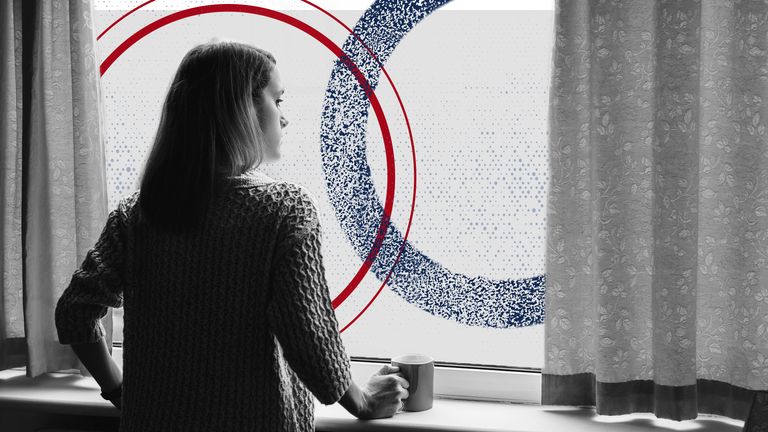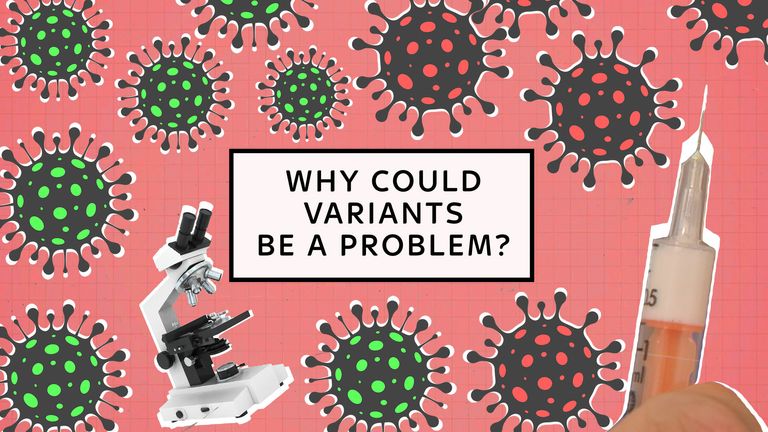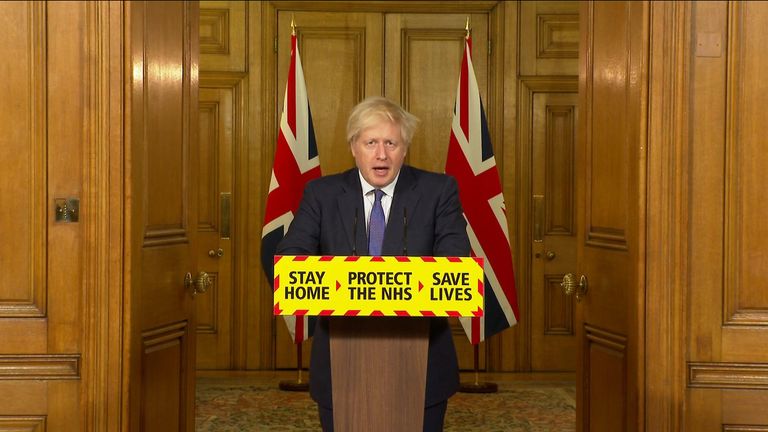COVID-19: What you should do if you live with someone with coronavirus
A SAGE document has set out a range of simple measures for all households to follow to reduce COVID transmission within homes.
Monday 18 January 2021 07:51, UK
Scientific advisers to the government have set out measures to reduce the transmission of coronavirus within homes, which they say can help cut the number of infections by up to 15% in just three weeks.
A document prepared for the Scientific Advisory Group for Emergencies (SAGE) was published on Friday following the recent surge in COVID cases linked to the new, more transmissible variant of the virus.
The scientists warn that the risks from transmission within homes "are likely to be elevated" due to the new variant and "lockdown alone may not be sufficient to reduce infection rates" in disadvantaged households.
Live COVID-19 updates from the UK and around the world
Among the measures suggested for all households, people should keep a window open at night in a shared bedroom where practical - and avoid sharing towels.
Households should also restrict visitors to only those who are essential and encourage them to wear face masks, while washing hands immediately after returning home is "good practice", the scientists add.
The document also lists steps that households should take if a resident is likely to be vulnerable to COVID-19, as well as when a member of the household is quarantining after coming into contact with an infected person, and when the household is isolating after someone living there has contracted the virus.
The scientists advise that as part of a "comprehensive package of information and support", overcrowded households in deprived areas should receive funding for "short-term emergency improvements to housing quality" or enhanced winter fuel payments.
This could be used to improve ventilation in the homes of the most vulnerable while reducing damp and mould, and therefore "minimising the risk of poorer COVID-19-related health outcomes in disadvantaged groups", they add.
The SAGE paper also suggests offering "vouchers for entertainment (e.g. online video or games providers)" to people required to self-isolate to boost adherence levels, "given that boredom, loneliness and perceived impact on mental health are associated with lower adherence".
"We estimate that if all the measures outlined in this paper were followed and an overall 25% reduction in within-household transmission risk were achieved, this could lead to a prevalence of 10-15% lower after three weeks," the scientists say.
Here are the suggested measures for households to follow in full:
Infection control measures for all households
The SAGE document advises:
• Restrict visitors to the home to only those who are essential
• Maintain distance as far as possible from any visitors to the home. Keep visits as short as practical
• Regularly air rooms, open windows and/or use extract fans before a visitor arrives, during their stay and for a short while afterwards
• Maintain comfortable temperatures and indoor humidity
• Shared bedrooms have been shown to pose a risk so keeping a window open slightly at night where practical may be beneficial
• Ensure plumbing systems are in good order as it is possible that some people may shed the virus through faeces
• Ensure the house is kept clean, especially bathrooms which studies have shown can be more contaminated. Clean after any visitors have come into the home
• Avoid sharing towels and other surfaces that are hard to clean, especially in houses of multiple occupation
• Close toilet seat lids before flushing which can minimise any contamination of the environment by faecal aerosols
• Excessive cleaning could cause other health issues due to exposure to chemicals so maintain good ventilation during cleaning activities
• Ensure good ventilation during activities such as high energy exercise in shared indoor spaces
• Pay particular attention to good hygiene during food preparation and ensure cutlery and crockery are washed thoroughly
• Wash hands regularly and immediately after returning home
• Safely dispose tissues and immediately washing hands afterwards
• Face coverings are likely to be beneficial for visitors such as tradespeople and for occupants of the home during a visit
Measures when a person in the household is likely to be vulnerable to severe effects of infection
In addition to the measures above, the scientists advise:
• Regular asymptomatic testing for anyone in education or working outside the home in public facing roles
• Keeping areas well ventilated where a vulnerable person has to interact with anyone else
• Maintaining greater distance between the vulnerable member and others in the household - such as sleeping in a separate room if possible and rearranging furniture to make distancing easier
• Limiting the use of shared objects such as towels, cutlery and crockery
• Maintaining good respiratory and hand hygiene
• Strongly encouraging any visitors to the home to wear face coverings
Measures when a member of the household is quarantining after being a suspected contact of someone with COVID-19
In addition to the measures above, the SAGE paper advises:
• Considering restricting the contact to a different room as far as possible
• Ensuring rooms where the contact spends time are well ventilated, especially if they have to be shared with others
• Not allowing any visitors to the home unless they are critical for health/care or emergency reasons
• Avoiding activities that may generate aerosols, such as singing or high energy exercise within shared rooms in the home
• Paying more attention to limiting the use of shared surfaces and objects
• Where possible, contacts should use a different bathroom to avoid contaminating surfaces. Where this is not possible, they should always clean the bathroom after use
• Contacts should avoid preparing food themselves as far as possible, and where this is unavoidable, they should use kitchen facilities at a different time and clean afterwards
• Where possible, the contact should eat separately from the rest of the household, ideally within the room where they are quarantining
• Washing clothes, towels and bedding more regularly
• Ensuring enhanced hand hygiene for all household members
• Evidence suggests that wearing face coverings where there is a case in a household can reduce transmission. If the contact has to interact with others it would be beneficial for them to wear a face covering. These should be washed regularly/disposed properly
Measures when a member of the household has tested positive and they (and the rest of the household) are isolating
In addition to the measures above, SAGE advises households should:
• Confine the infected person to a different room as far as possible, with their window open and door closed
• Maintain greater distancing between all other household members in case others are infected
• Maintain good ventilation in all rooms where people spend time
• Not allow any visitors to the home unless they are critical for health/care or emergency reasons
• Restrict all use of shared objects as far as possible between all household members
• Maintain an enhanced standard of cleaning throughout the whole house is likely to be beneficial, assuming that any member could be infected. Always use PPE and other protections for people carrying out domestic and caring work
• Ensure high-touch surfaces, such as door handles, and items (e.g. cutlery/crockery) are cleaned thoroughly if providing care to the infected person
• Ensure enhanced hand hygiene for all household members
• Wash clothes, towels and bedding for all household members more regularly, with those from the infected person on a hot wash
• There may be benefits to all adult household members wearing face coverings if they have to interact with the infected person or in close proximity to each other. These should be washed regularly/disposed properly
• Where care needs to be provided to an infected person, additional PPE such as gloves and eye protection may be beneficial
• Good hand hygiene following any care of an infected person is essential








